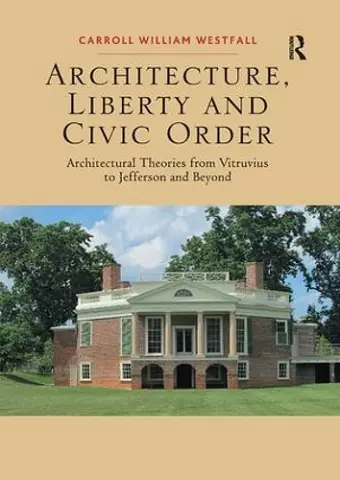Architecture, Liberty and Civic Order
Architectural Theories from Vitruvius to Jefferson and Beyond
Carroll William Westfall author
Format:Paperback
Publisher:Taylor & Francis Ltd
Published:12th Oct '17
Currently unavailable, and unfortunately no date known when it will be back
This paperback is available in another edition too:
- Hardback£145.00(9781472456533)

This book brings to light central topics that are neglected in current histories and theories of architecture and urbanism. These include the role of imitation in earlier centuries and its potential role in present practice; the necessary relationship between architecture, urbanism and the rural districts; and their counterpart in the civil order that builds and uses what is built. The narrative traces two models for the practice of architecture. One follows the ancient model in which the architect renders his service to serve the interests of others; it survives and is dominant in modernism. The other, first formulated in the fifteenth century by Leon Battista Alberti, has the architect use his talent in coordination with others to contribute to the common good of a republican civil order that seeks to protect its own liberty and that of its citizens. Palladio practiced this way, and so did Thomas Jefferson when he founded a uniquely American architecture, the counterpart to the nation’s founding. This narrative gives particular emphasis to the contrasting developments in architecture on the opposite sides of the English Channel. The book presents the value for clients and architects today and in the future of drawing on history and tradition. It stresses the importance, indeed, the urgency, of restoring traditional practices so that we can build just, beautiful, and sustainable cities and rural districts that will once again assist citizens in living not only abundantly but also well as they pursue their happiness.
"The alphabet of wood and stone has been arranged over the ages to shape and express the values and aspirations embodied in civic life. Architecture, Liberty and Civic Order is at once a commanding chapter in architectural history and a significant treatise on philosophy of art. Professor Westfall's narrative guides the reader to the various purposes served by that one form of art that is irreducibly civic. The treatment is authoritative and accessible; rich and deeply suggestive. It is also a much needed challenge to conventional wisdom on the alleged "progressive" evolution of genres." - Daniel Robinson, Oxford University, UK and Georgetown University, USA
"Westfall presents this immensely impressive and intellectually innovative study of the great names in the history of architecture and architectural theory from antiquity to the present day as a book about the most important thing we can make, the city. He sees throughout the significance of religion and politics, noting how Vitruvius prided himself for being the client of his imperial patron, while Alberti presented the architect as a citizen who renders his service as a participant in the protection of his city’s liberty and ... the pursuit of the good. He observes of the International Style that Buildings based on the machine analogy remain mere buildings and cannot become architecture. There are challenging thoughts on every page of this deeply researched book on the classical language of architecture, timeless but ever new." - David Watkin, University of Cambridge, UK and Honorary Fellow of the Royal Institute of British Architects
ISBN: 9781138567801
Dimensions: unknown
Weight: 410g
220 pages